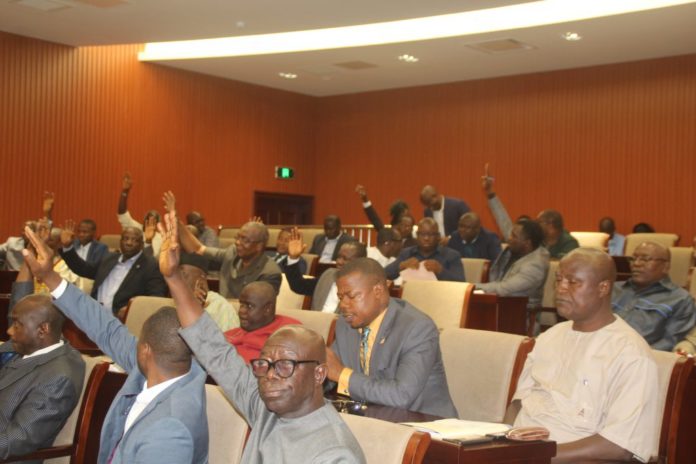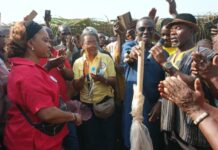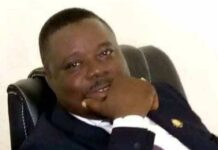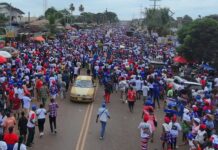The Institute for Research and Democratic Development (IREDD) has released its quarterly scorecard for Liberian Legislature performance.
The latest report card is under theme “Demanding Greater Legislative Openness and Accountability” with several lapses recorded during the period.
IREDD is calling on the leadership of the Legislature to demand or press for efficiency and productivity from legislative committees.
Report card detail
- Plenary Attendance
- Present –A total of one thousand, one hundred and thirty two present times were recorded at the House of Representatives and four hundred and ninety five present times were also recorded at the Liberian Senate.
- Absent- A total of three hundred seventy six absences were recorded at the Legislature, Members of the Senate accounted for 57 while Members of the House of Representatives accounted for 319.
- Distant- The plenary of the Liberian senate recorded a total of 33 distant times during its 21 sittings while the House of Representatives experienced 73 distant times.
- Excuse- A total of 5 excuse times were recorded at the senate while the House of Representatives recorded 5 excuse times respectively.
- Sick- A total of four sick times were recorded at the House of Representatives while eighteen sick times were recorded at the Liberian Senate.
- Participation –During this reporting period, there were a total of 572 participation times in the Senate and 629 at the House of Representatives
Lawmaking
- Bills in Committee Room-IREDD research has recorded a total number of 19 Bills in Committee room at the Legislature. Of the 19 bills, 9 have been deposited at the House of Representatives and 10 at the Liberian Senate.
- Bills passed into Law –The Institute for Research & Democratic Development (IREDD) `s research recorded a total number of thirteen (13) Bills passed by the Legislature. Of the 13 bills, 4 came from the House of Representatives and Nine (9) came from the Liberian Senate.
Petitions-Our Research recorded a total number of two (2) petitions from Citizens of Liberia to the Legislature. The petitions came from the African Youth with Disability Network (AYWDN) recommending the Legislature to speedily pass an Act Creating a National Commission on Disability 2018 submitted on January 24, 2019; the second Petition was by some aggrieved teachers of the Monrovia Consolidated School System (MCSS) recommending adjustment of salaries among others and was presented on January 24, 2019.
Oversight Responsibility
Legislative Oversight is reflected in the following Legislative instruments:
- Communication-There were eighty (80) communications recorded during the period, of the 80 communications recorded, twenty five (25) came from the Liberian Senate, while fifty five (55) came from the House of Representatives respectively.
- Legislative Motions – IREDD research tracked seventy (70) Legislative Motions from the House of Representatives and the Liberian Senate. Of the 70 Motions, 38 or 54.28% came from the Liberian Senate while 32 or 45.72% came from the House of Representatives respectively.
- Committee Reports- During the reporting period, our research recorded twenty eight (28) Legislative Committee’s reports from the House of Representatives and the Liberian Senate. Of the 28 Committee reports, 20 or 71.4% were recorded at the Liberian Senate while 8 or 28.6%% came from the House of Representatives.
Monitoring Findings
House of Representatives
Members of the House of Representatives obtained the total of one thousand, one hundred and thirty two (1132) present times with seven (7) Representatives obtaining the highest present times with a score of 100% or A+. Those Representatives include; Hon. Kanie A. Wesso of Gbarpolu county, Hon. Matthew Joe of Grand Bassa County from the ruling CDC, Hon. Bhofal Chambers of Maryland County from the ruling CDC, Hon. Matthew Zarzar of Sinoe County from the Unity Party, Hon. Ivar Kokulo Jones of Margibi county – Independent Representative, Hon. Samuel G. Korgar of Nimba county from the People Unification Party (PUP) and Hon. George S. Bolley of Grand Gedeh Country from the United People Party (UPP). On the contrary, three Representatives got the lowest in plenary attendance. These Representatives include; Hon. Vicent S. T. Willie of Grand Bassa County- Independent, Hon. Hans Barchue of District #1, Grand Bassa County-Independent, Hon. Bob H. Sheriff of Grand Cape Mount county-Independent and Hon. Emmanuel Zoe Pennue of Grand Gedeh County-Independent. They all got below average by obtaining 47.23% or F in plenary attendance.
- House of Senate
A total of four hundred and ninety five (495) present times were recorded at the Liberian Senate with Five (5) Senators obtaining the highest present times with an average of 100% or score A+. The Senators are; Sen. Albert Chie of Grand Kru County –Independent, Sen. J. Gbleh Bo Brown of Maryland County – Independent, Sen. Henrique Togba of Bong county Independent, Sen. Morris Saytumah of Bomi county from the Unity Party and Sen. Augustine Chea of Sinoe County from the CDC. They all obtained an average score of 100% or A+ in plenary attendance. On the contrary, Senator Edward Boakai Dagoseh obtained the lowest present times by scoring 38.2% or F. We wish to note that Senator Dagoseh has been sick.
Participation/Plenary Debate
During this reporting period, there were a total of 572 participation times in the Senate and 629 at the House of Representatives
- House of Representatives
Members of the House of Representatives obtained a total of six hundred and twenty nine participation times during the period under-review. Three Representatives obtained the highest participation times; those Lawmakers include Hon. Matthew Zarzar of Sinoe County from the Unity Party, Hon. Acarous Moses Gray of Montserrado County from the Coalition for Democratic Change (CDC) and Hon. Edward W. Karfiah of Bong County from the People Unification Party (PUP). On the contrary, five Representatives obtained the lowest participation times, those Representatives include Hon. George S. Bolley of Grand Gedeh county from the United People Party (UPP), Hon. Nathaniel N. Bahway Sr. of Grand Kru County from the Liberian National Union (LINU), Hon. Francis Saywon Young of Rivergee County from the Movement for Economic empowerment (MOVEE), Hon. Mambu M. Sonni of Grand Cape mount County from the Liberty Party (LP), and Hon. Morris Lawrence of Montserrado county Independent Representative.
House of Senate:
During this reporting period, there were a total of 572 participation times in the Liberian Senate. Five Senators obtained the highest participation, those Senators include Sen. J. Gbleh Bo Brown of Maryland County – Independent Senator, Sen. J. Milton Teahjay of Sinoe County from the former ruling Unity Party, Sen. George Tengbeh of Lofa County from the former ruling Unity party and Sen. Matthew N. Jaye of Rive gee County from the former ruling Unity Party. On the Contrary, four Senators obtained the lowest plenary present times those senators include Sen. Prince Y. Johnson of Nimba County from the Movement for Democracy & Reconstruction (MDR), Sen. Marshall Dennis of Grand Gedeh County from the CDC, Sen. Edward B. Dagoseh of Lofa County from the Unity Party and Sen. Thomas Grupee of Nimba County from the National Union for Democracy Party (NUDP).
Plenary Attendance – House of Representatives
The Coalition for Democratic Change is the ruling political party of Liberia and has the total of 21 Representatives at the House of Representatives. The Coalition for Democratic Change (CDC) obtained the total of three hundred and fifty five present times at the House of Representatives and obtained the cumulative average of 1.28%. Moreover, six of its members attended all of the 21 plenary sittings and got A+ or 100%. On the Contrary, six members of the ruling CDC obtained F and D in plenary attendance. CDC obtained the total of eighty five absent times at the House of Representatives and eleven distant times.
The former ruling Unity Party obtained the total of two hundred and ninety seven Present times and acquired 1.41%. Only one Representative from the former ruling Unity party attended all of the 21 plenary sittings and obtained an average score of 100% or A+. On the contrary, four Representatives obtained an average score 50.3% and below and got F in plenary attendance. UP obtained the total of seventy six absent times and forty five distant times at the House of Representatives.
Independent Representatives obtained the total of one hundred and ninety nine Present times at the House of Representative and got an average of 3.45%. Two Independent Representatives obtained an average score of 100% or A+ and Four obtained an average score of 47.8% or F in plenary attendance.
The People Unification Party (PUP) obtained the total eighty five present times at the House of Representatives and acquired an average of 1.23% in plenary attendance. There was one Representative from the PUP that attended all of the 21 Plenary sittings and obtained an average score 100% or A+ while one Representative on the contrary obtained 47.62% or F. in Plenary attendance.
The United People Party has one Representative at the House of Representatives – Hon. George S. Bolley. Hon. George S. Bolley attended all of the plenary sittings and obtained an average score of 100% or A+ in plenary attendance. The rest of the political parties Representatives fail to obtain an average score of 100% or A+ in plenary attendance.
Plenary Participation –The Unity party obtained the total of one hundred ninety two in plenary participation and rank the first highest political parties in participation and was followed by the Coalition for Democratic change (CDC) that obtained the total of one hundred and ninety participation times and was rank as the second highest party in participation. Additionally, the Independent Representatives obtained the total of eighty five in plenary participation and was rank as the third highest party. The rest of the political parties went below the average score of participation. This indicates that many Representatives are not pushing the agenda of their political parties and are not commenting on plenary agenda items.
Independent Senators obtained the highest average in plenary attendance, they all attended all of the 21 plenary sittings held at the House of Senate and acquired an average score of A+. The Independent Senators were followed by the Unity Party that rank second at the Liberian senate by one attending all of the plenary sittings and acquired an average score of A+. The rest of the political parties Senators did not obtain A+ in plenary attendance
Lawmaking
The effective functioning of government functionaries are greatly informed by the types of laws or legal framework of the Liberian government.
The House of Senate
Bills in committee Room
A total of ten Legislations were recorded at the Senate and sent into committee room for review and possible recommendations for passage.
Bills Passed
During the period, Nine Legislations were passed by the Liberian Senate. Of the 9 Legislations, the Senate concurred with the House on 6 Legislations.
Our research also recorded five Senators who introduced Bills at the Liberian Senate. Amongst the five Senators, was Senator Varney G. Sherman of Grand Cape Mounty County who introduced 3 Bill constituting the highest.
Petitions
The Liberian Senate received two petitions from the citizens of Liberia. The Petitions were sent to relevant committee to be reviewed and report to plenary for action.
The House of Representatives
- Bills in committee room
During the period, IREDD recorded a total of nine bills that were sent into committee room for review and passage.
There were two Representatives that introduced bills, these Representatives include Hon. Larry P. Youngquoi of Nimba County from the Unity Party and Hon. Prince O. S. Tolkpah of Nimba County from the People Unification Party.
- Bills Passed
The House of Representatives concurred with the Liberian Senate on four Legislations during the period from January 15 to March 19, 2019.
- Oversight Responsibility
Legislators, consistent with Constitutional checks and balances, have oversight over Government Ministries and agencies via legislative committees. The committees exercise their right to cross-check the performance report of those Ministries and Agencies. By this the public through their representatives are kept abreast of how funds are allocated and expended. The exercise of this legislative responsibility is often expressed by individual lawmaker’s request for explanation from Ministries and Agencies on budgetary allocation they received from the national coffers and/or by writing an official communication/letter to plenary through the office of the Presiding Officer on the conduct of the management of a particular government agency.
- Communications
House of Senate
A total of twenty five (25) communications were recorded at the Senate. Of the 25 communications, Sixteen (16) came from Senators, seven (6) came from the President (George M. Weah) and three (3) came from the Public. Senator Nyonblee K. Lawrence of Grand Bassa County from the Liberty party wrote the highest communications amongst Senators – she wrote three communications and was followed by Sen. George Tamba Tengbeh of Lofa County from the Unity Party and Sen. Sando D. Johnson of Bomi County from the National Patriotic Party of Liberia (NPP) Each of them wrote two communications.
House of Representatives
A total of fifty five (55) communications were recorded at the House of Representatives. Of the 55 communications, 40 or 72.7% came from Representatives, 12 or 21.8% came from the Public and 3 or 5.45% came from President George M. Weah.
There were thirty Representatives who wrote communications during the period under review, these Representatives include Representatives Clarence Massaquoi of Lofa County from the Unity Party, Hon. Munah Pelham Youngblood of Montserrado County from the CDC, Hon. Crayton Duncan of Sinoe County from the Unity Party, Hon. Francis Dopoh of Rivergee County from Unity Party, Hon. Dixon Seboe of Montserrado County from the CDC, Hon. Ben Fofana of Margibi County from Unity Party, Hon. Larry Younquoi of Nimba County from the Unity Party, Hon. J. Nagbe Sloe of Sinoe County from the Unity Party, Hon. Dorwohn Gleekia of Nimba County from the People Unification party, Hon. Vicent Willie of Grand Bassa County – Independent Representative, Hon. Ivar Jones of Margibi County – Independent Representative, Hon. Matthew Joe of Grand Bassa County from the CDC and Hon. Prince Tokpah of Nimba County from the People Unification party. Other Representatives who wrote communications include Hon. Kanie Wesso of Gbarpolu County from the CDC, Hon. Isaac Roland of Maryland County from CDC,
Hon. Edward Flomo of Montserrado County – Independent Representative, Hon. Yekeh Kolubah of Montserrado County Independent Representative, Hon. Marvin Cole of Bong County from the CDC, Hon. Haja Fata Siryon of Bomi County from the unity Party etc.
IREDD takes key interest in the following communications:
- Francis Dopoh communication Requesting that the Minister of the Ministry of Finance& Development Planning (MFDP) and the Commissioner General of LRA be invited to discuss the performance of the last two fiscal quarters of the current National Budget. The decision of plenary to mandate relevant committee to probe into the Matter is yet to be taken.
- Dixon Seboe communication Pleading with plenary to invite the Ministers of Commerce and Industry, MFDP and other relevant govt. institutions to begin a frank discussion on one easy and quick win to move the economy from eight-hour to twelve-hour or fourteen-hour. The communication was sent to the Committees on Commerce and Ways, Means, Finance & Planning for immediate action and repot to plenary for 2 weeks. However, the committees are yet to report.
- Ben A. Fofana Requesting the HOR to invite the Minister of Finance and Development Planning along with his deputies to provide reasons why counties have not yet received their county and Social Development Funds and other remittances since the passage of 2018/2019 National Fiscal Budget.
Committee Reports
Committee Reports- During the reporting period, our research recorded twenty eight committee reports at the House of Representatives and the Liberian Senate. Of the 28 committee reports, the Liberian Senate accounts for 20 while the House of Representatives accounts for eight (8) committee reports respectively.
- Legislative Motions
Every Legislative issue or bill that is officially discussed in plenary session based on the motion made by a Senator or Representative and seconded by a Senator or Representative and subsequently accepted by majority members of Senate or House of Representatives seated during plenary session. Every Senator or Representative has the opportunity to raise his or her hand to be recognized by the Speaker and the President Pro-Tempore of the House of Representatives and the Liberian Senate or the Presiding officer of the day`s session. During the data collection period, IREDD research tracked seventy Legislative Motions from the House of Representatives and the Liberian Senate. Of the 70 Motions, 38 or 54.28% came from the Liberian Senate while 32 or 45.72% came from the House of Representatives respectively.
At the Liberian Senate, there were Senators who were very engaged in moving motions for the discussion of Legislative issues or agenda. However, we also noticed that of those Senators there were five who were very effective and efficient in moving motions. Those Senators include: Sen. Alphonso Gaye of Grand Gedeh County, Sen. J. Gbleh Bo Brown of Maryland County, Sen. Oscar A. Cooper of Margibi County, J. Milton Teajay of Sinoe County from the Unity Party and Sen. Matthew Jaye of Rivergee County from the Unity Party. At the House of Representatives, there were many Representatives who were engaged in moving motions but with five Representatives being very proactive and effective in moving motions. Those Representatives include: Hon. Matthew Zarzar of Sinoe Country from the Unity Party, Hon. Clarence Massaquoi of Lofa County from the Unity Party, Ben Fofana of Margibi County from the Unity Party, Richard Koon of Montserrado county from the Unity Party and Hon. Acarous Moses Gray of Montserrado County.
- General Observation(s)
During the quarter, we could not obtain information on legislators’ efforts to request quarterly performance report from government ministries and agencies that received budgetary allocations from the national budget as prescribed in the budget law. One could speculate that this is either because much effort was not made by the lawmakers to obtain the performance reports or because such information was treated with secrecy. This tendency creates a room for limited accountability and transparency in those ministries and agencies.
There was serious punctuality problem during the entire reporting period. Most sessions started late, often an hour or more. This was in violation of rule #2 of both Houses which put the starting time at 10:00am on every session day (Tuesday and Thursday). As observed during the reporting period, regular plenary sessions were not only starting late but also a number of lawmakers were recorded late (those who came in after roll call).
The tradition of “Secret Legislative Sessions” continued throughout the entire period, virtually obscuring the transparency and accountability commitment of the National Legislature. What is becoming to be known as the “Secret Session Syndrome” appeared to be more prevalent in the Senate? This is the tendency where the lawmakers take behind closed doors critical national decision-making processes in an apparent bid to evade public monitoring and observation of how subsequent decisions of the secret deliberations are arrived at; who took what stance and why. Though authorized by the rules of both chambers, most of the secret sessions held by the Legislature, particularly the House of Representatives, were void of state security justifications consistent with best legislative practices.
We also note with disappointment, the level of secrecy that beclouds decision making processes at the legislature partially on record of vote. For example, the non-adherence of Rule 21 which clearly articulates how votes should be obtained at the House of Representative have consistently being flouted by the speaker and the leadership of the House of Representatives as well as at the Liberian Senate.
Our research findings revealed that most legislative committees are still far from transparency and effectiveness. Legislators themselves lament the delay of legislative committees to act on crucial national issues. For example Hon. Richard Koon wrote a communication that was read on Tuesday March 12, 2019 requesting plenary to discharge from committees room the following Legislations:
- An Act to repeal the act establishing the National Commission on disabilities of 2005, as an Autonomous Agency in Liberia and to enact in lieu thereof the Act creating the National Commission on disabilities of 2018 and
- An Act to enact the bill on the establishment of the National old Folks Commission of 2018.
Recommendations on the monitoring
- The leadership of the Legislature should demand or press for efficiency and productivity from legislative committees. If possible, the leaderships of those committees, including Standing Committees should be restructured to reflect the level of knowledge, effectiveness and willingness of committee members to execute their assigned task.
The Legislature should make sure that quarterly performance reports by government ministries and agencies benefiting from national budget are produced. This is upheld by the state’s budget law which is a product of the every Legislature. This will help the public cross-check the level of accountability and transparency measures used by public officials in handling taxpayers’ funds.
- The 54th Legislature should review its standing rules on secret sessions in view of making legislative deliberations, particularly the workings of Legislative Committees, more transparent and participatory. Furthermore, they should review their standing rules on attendance so as to penalize lawmakers who are in the constant habit of leaving session after roll call and those that continued to gain strength in lateness.
- The leadership of the House of Representatives and Senate should take steps to improve the level of transparency and openness in decision making process within the legislature. Particularly, IREDD calls for the adherence of legislative rules on record of the vote in order to improve transparency in vote taking on legislation and national decisions.
The IREDD report constitutes the first quarter monitoring report for 2019 and covers the period January 15th to March 19th. The Legislative Performance Monitoring report is meant to provide Liberians citizens with accurate, objective, and comprehensive information about the performances of their elected leaders using indicators drawn from their primary constitutional mandate (Lawmaking, Oversight and Representation).


























Comments are closed.